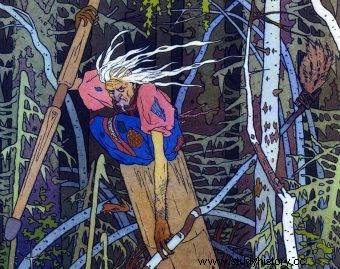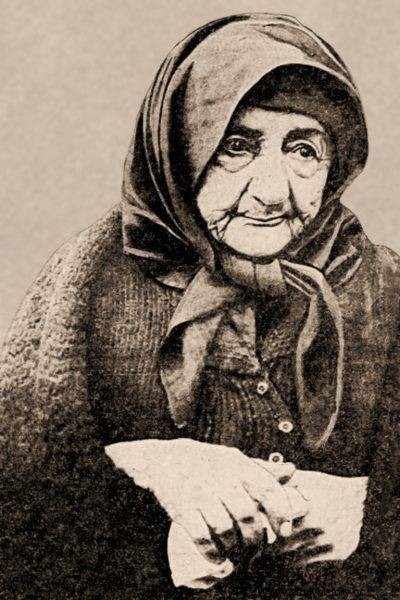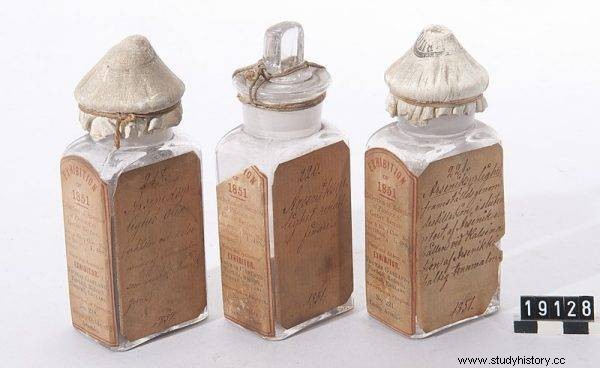Folk fairy tales are filled with tales of witches and mysterious herbalists who, with their power, could heal others, but also destroy and kill ... History shows that in these "stories for children" there is more than just a grain of truth. This is evidenced by the character of Baba Anujka - a serial killer from the Balkans, who sent her victims to the other world with the help of "magic water".
Ana Drakšin was born in Wallachia around 1837 in the home of a wealthy cattle breeder. When the girl was in her teens, her family moved to the village of Vladimirovac in the Serbian part of the Austrian Empire. From there, she was sent to a nearby school for the wealthy, where she received a thorough education.
After completing her education, Ana was fluent in five languages and knew the basics of chemistry and medicine, which she studied further. She wanted to heal people, but her practices were directed more towards traditional methods, drawing on herbalism. Unfortunately, her private life was not going so well anymore.

Folk fairy tales are filled with tales of witches and mysterious herbalists. History shows that there is more than just a grain of truth to them.
At the age of 20, Ana was seduced by an Austrian officer. The romance paid for with a broken heart and contracting syphilis. This event left such a strong mark on her psyche that she would hate men and avoid people. She locked herself in her family home, but the isolation did not last long, because Ana's father decided to marry her to a wealthy landlord who was over 20 years her senior.
Ana stopped practicing folk medicine then, and the relationship turned out to be quite successful and compatible. Unfortunately, there was also a tragedy in it. The woman gave birth to 11 children, but only one survived to adulthood. She experienced the departure of each of the children very much. To make matters worse, the son who remained alive after getting rich from trade, went to America. When her husband died after 20 years of marriage, Ana was left alone. However, she gained the freedom to manage her life and decided to return to what she loved most - herbal medicine.
Magic water for marital ailments
At home, she set up a kind of laboratory that she called the alchemist's workshop. In it, she prepared potions to heal various diseases. However, her potions not only solved health problems, but also helped men avoid military service.
Conducting the practice allowed her to live a stable and dignified life. It also contributed to her being perceived as a local witch, earning her the nickname Baby Anujki over the years. Its "magic water" was the most popular among the clients. This mixture was to turn out to be a lethal drug, and Ana was to be called the most terrible Balkan murderer.
Sources say that the woman always paid attention to the correct dosage of potions. She was to warn that too small a dose would not bring any effects, and too much could contribute to a tragedy. Therefore, it is difficult to say whether the first deaths were the result of her actions or the carelessness of the victims' partners. Nevertheless, with time, Baba Anujka was visited by more and more men who were bored with their "old" wives and wives who were looking for a permanent solution to their husbands' hot-tempered temperaments.

Baba Anujka in 1929 during the trial
In response, the herbalist asked only one question:"How big is this problem?" Then the client or client gave the approximate body weight of the victim, and then they became witnesses of Baba Anujka's magic.
The woman was well aware of the power of the visual message, which is why she supplemented her work with a large dose of theatricality. She wore black, the interior of her house was shrouded in an atmosphere of mystery, and during client visits she whispered unknown words and performed magic rituals which culminated in the sale of a vial containing a mixture of arsenic and plant toxins. After drinking it, victims died within two weeks.
Baba Anujka's "magic water" was feared especially among men, but the woman was also famous for her clairvoyant skills. They were to attract officers and ministers from the entire Austro-Hungarian Empire. The reputation of the Banat witch built in this way protected her from the interest of the police, which, for lack of concrete evidence - and for fear of charms - did not respond to the reports of local peasants. However, the situation was about to change.
Suspicious deaths
In 1914, the newlyweds were walking past Baba Anujka's house on the way from their wedding. The day was hot and the woman was supposed to offer them a glass of water. Eight days later, after a mysterious illness, a young wife died, and then her husband. Their deaths finally caught the attention of the services that arrested Ana on suspicion of murder. In June 1914, the herbalist was brought to trial.
Due to insufficient evidence and the local population testifying in favor of Baba, the herbalist was acquitted. Among the witnesses called to the court, there was a conviction that Ana is a real witch and anyone who dares to threaten her will sooner or later be punished. Was the woman really responsible for the death of the bride and groom? This has never been established as most of the documents related to this case disappeared in the turmoil of World War I.
After the collapse of the Austro-Hungarian Empire, the area inhabited by Baba Anujka became part of the Kingdom of Serbs, Croats and Slovenes. In order to find herself in the new reality, Ana, 80, needed someone to help drive her clientele. The choice fell on Ljubina Milankov.

photo:Petter Häll / CC BY 4.0 Baby Anujka's "Magic Water" contained a mixture of arsenic and plant toxins.
In the 1920s, she acted as a trading agent for Baby Anujki. Her task was to track potential clients of the herbalist. In nearby villages and towns, Milankov eavesdropped on local women, catching those with marital problems. Then, as if by accident, she joined their conversations, for example at the well or at the market, and praised Baba's skills, calling her a miracle worker and a clairvoyant. Then she told the herbalist in detail, so that at the very beginning, when a given client appeared on the doorstep of her house, she "read" things from her eyes, hands and face that she should not know about.
Ljubina also helped Anna in running the workshop. She prepared drugs and magic potions, learning about Baba's specifics. This perfect arrangement couldn't last forever . In the past, the victims of herbalists were mostly rural women and men, but now wealthier and more important citizens started to appear. A wealthy innkeeper and restaurateur, the widely respected mayor of Pančeva, and finally a 39-year-old son from a wealthy house and his 80-year-old father. These deaths and the benefits they brought to the wives and daughters of the deceased attracted the attention of the Vojvodina authorities.
Punishment for the witch
In July 1928, Ana and Ljubina were arrested, and a year later convicted of contributing to two poisoning murders. Baba, then 92 years old, was sentenced to 15 years in prison, her partner - eight years, and the two clients to whom they sold the poison were sentenced to life imprisonment. Of course, the herbalist did not plead guilty until the end. It was also difficult to prove her other crimes, as many families refused to exhumate in order to examine the bodies of relatives. Probably for fear of the punishment awaiting them.
Although the woman was ultimately only accused of complicity in two crimes, the estimated number of victims is between 50 and 150, making her the most dangerous serial killer in the Balkan region. Her crimes were covered in newspapers from the US to Australia at the time.
How did she finally end her life? Historians disagree here. One theory is that she was released from prison after eight years and died at the age of 100 in her home. Another, that only the entry of German troops into the Kingdom of Yugoslavia in 1941 brought her liberation - at the age of 104. Later, hearing about her would be lost…
Bibliography
- https://www.krzywatorium.pl/baba-anujka-najwieksza-balkanska-morderczyni-126-mordercy/ (accessed:10/01/2021).
- http://yugolski.pl/yugopis/krzywalne-zagadki-jugoslawii-cz-1/ (accessed:10/01/2021).
- https://trove.nla.gov.au/newspaper/article/71160355 (accessed:10/01/2021).
- https://www.newspapers.com/image/355296157/?terms=%22love+potion%22+poison (accessed:10/01/2021).
